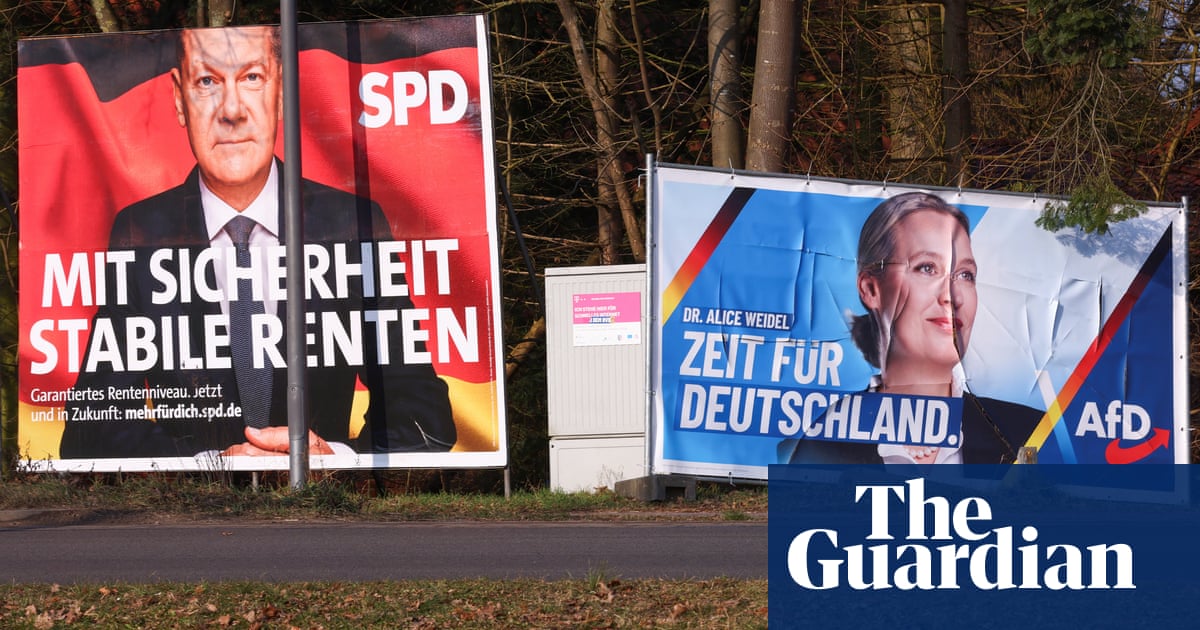In the tumultuous German election campaign, which has been rocked by jaw-dropping US interference, a spate of violent attacks and rare fears for the country’s political stability, all eyes have been locked on the party most likely to finish second.
When the dust settles after Sunday’s vote and conservative opposition leader Friedrich Merz is – barring further surprises – elected chancellor, the 2025 race will be remembered as the moment the far-right Alternative für Deutschland, consistently polling in second place, went from sideshow to centre stage.
What began as a professors’ party opposing eurozone bailout packages has morphed in just 12 years into an ever more radical force, feeding on anti-migrant sentiment and incorporating neo-Nazis into its ranks.
“For the last decade the state has been violating law and order,” the AfD’s first chancellor candidate, Alice Weidel, said this week, referring to the flow of new arrivals at the border.
Turning to Merz’s party and its longtime leader, she added: “That began with the CDU and Angela Merkel and is continuing under the current government and anyone who points this out gets banished to the ‘rightwing’ corner.”
Germany built its postwar identity – with the fundamental help of the Americans – around preventing parties like the AfD from gaining power.
But high-profile votes of confidence from Tesla tycoon Elon Musk and US vice-president JD Vance, who met the AfD leader in Munich last week, have only reinforced the impression that the wind is at the party’s back.
Even as the other parties reject any cooperation with the AfD, which is under surveillance by security authorities for suspected extremism, it has successfully shifted the debate to focus on its central talking points.
Analysis by Die Zeit showed that parties deep into the leftist spectrum had adopted the AfD’s rhetoric, particularly on crime and immigration, allowing the issues to dominate the campaign at the expense of the shaky economy, the climate crisis and threats to European security.
AfD voters speaking to the Guardian on the campaign trail take umbrage at the mass pro-democracy demonstrations that have risen up against the party. “We are not Nazis” is a protestation heard over and over in far-right strongholds.
But language that only a year ago was considered anathema, such as calls for “remigration” or mass deportations of foreigners and citizens deemed to be unassimilated, are now commonplace among AfD supporters and leaders.
Riding a wave of populist-nativist momentum that has swept across countries including Italy, the Netherlands, Sweden, Austria and Finland, the AfD looks poised to capture a historic one in five votes as it expands from its heartland in the former communist east, deep into the western rust belt.
The vaunted “firewall” – an unwritten rule among the mainstream parties barring cooperation with the far right – will almost certainly keep the AfD out of power.
“I would sell the soul of the CDU if I went down such a path,” frontrunner Merz insisted in a televised debate this week, referring to any alliance between his centre-right Christian Democrats and the AfD.
But the AfD is expected to have enough sway as the biggest opposition party to complicate coalition building and obstruct the government on several fronts including the power of the purse.
Chancellor Olaf Scholz, whose Social Democrats are running in third place in the polls, has called on voters to turn their backs on the AfD, hailing Germany’s “good tradition” since the Nazi era of rejecting the extreme right.
Weidel, whose inclusion on the prime-time debate stage was seen as a triumph of normalisation, called the comparison “scandalous”, adding: “You can insult me here tonight as much you like. You are insulting millions of voters.”
The far right had been relatively slow in gaining traction in Germany. This was often attributed to the lessons drawn from the horrors of the Nazi period, which were hardwired into the country’s Basic Law and passed on to generations of children in the 80 years since the second world war.
after newsletter promotion
Musk, however, has endorsed AfD attempts to absolve Germany of enduring responsibility for the Holocaust, condemning “too much focus on past guilt”.
Analysts see the turning point in backing for the AfD in the 2015 refugee influx, which under then chancellor Merkel saw roughly 1.3 million people arrive in Germany after fleeing war and oppression in countries such as Syria and Afghanistan.
Although many of the arrivals have since integrated – finding homes, work and schooling – communities have complained that they haven’t been given the resources to address hundreds of thousands of refugees’ basic needs, including psychological care to address trauma.
The migration issue has come to a head in the curtailed campaign – the election was brought forward seven months after Scholz’s centre-left-led government collapsed in November amid a series of deadly attacks blamed on asylum seekers.
Despite his “firewall” pledge, Merz accepted AfD support in parliament for tough border proposals he said were “essential” after a stabbing spree targeting small children and a car ramming into a bustling Christmas market.
Merz’s decision was widely seen as a breach of a taboo and he has failed to claw back votes from the AfD for his conservative bloc, which has been stuck on 30% despite the historic unpopularity of Scholz’s government.
The AfD “seem to be the main winners from the reigning mood of pessimism in German society against the backdrop of a very gloomy economic outlook,” said James Conran of Oxford University’s Blavatnik school of government. “The big question is just how far to the right the country is about to shift.”
Weidel, who has two sons with her same-sex partner, has basked in the attention from Trump’s Washington, with Vance denouncing the firewall as “undemocratic” and Musk repeatedly denigrating her opponents. The AfD’s attempt to link arms with the White House could backfire, however.
“Trump isn’t popular in Germany – even many AfD supporters don’t like him,” said Kai Arzheimer, a political scientist at the University of Mainz.
But analysts say the mainstream parties have only another few years to demonstrate they can address voters’ fundamental concerns or risk the far right coming out on top.
The centrist parties “want to hold on to power even though they’ve driven the country into a wall”, said sales executive Mario Krause, 54, an AfD supporter in the eastern town of Schkeuditz.
“We’re middle class, we’re completely normal citizens and we want drastic change. It may not work this time but I feel good about the election after.”
Article by:Source:













